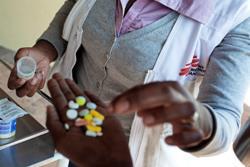Tackling childhood obesity a family affair


At just seven years old and almost 50 kgs, Angel Khoza is one of the nearly five percent of girls between the ages of two and 14 years old that are obese, according to the country’s first national nutritional survey released.
Conducted by the Human Sciences Research Council (HSRC) among about 25,500 South Africans, the survey found that about 40 percent of women and 12 percent of men were obese. South Africa’s kids have not escaped the growing obesity epidemic and about 18 percent of children under the age of 15 years old are estimated to be overweight while about four percent are obese.
When Angel began picking up weight, Angel’s parents thought nothing of it until they learned classmates had begun bullying Angel about her weight.
For the Khozas, helping Angel lose weight became a family affair. First on the list of habits that had to change were weekly meals out.
“I always thought I was spoiling my kids and showing them love by taking them to eat at McDonald and Spur eight times a month, but little did I know was harming them and putting her (Angel’s) health at risk,” said Angel’s father, Enoch.
The second change was learning to say “no,” Enoch told OurHealth.
“The mistake that most young parents like us make is not knowing when to say ‘no’,” he said. “(We) give our kids too much freedom and control in choosing their own foods.”
According to the HSRC study, about half of all children between the ages of 10 and 14 do not take a packed lunch to school. The same proportion of children said they took lunch money to school, leaving their parents little or no chance to police what makes up their midday meal.
Enoch also said it was important that the family set goals to lose weight and get active together. When they set goals, the Khozas tried to envision where they wanted to be in three months, he said.
Melanie Krause is a private dietician with the Allmed Clinic in Ermelo, Mpumalanga. According to Krause, more families might follow the Khozas’ lead in turning over a new leaf if not for common misconceptions.
“Eating healthy is important for the entire family,” Krause said.
“Unfortunately, there are a lot of misconceptions that discourage people from trying to change the way they eat,” she added. “The fact is that you don’t have to eat organic to eat healthily. Canned and frozen vegetables and fruit can be just as nutritious as fresh (ones)”
Among the HSRC study’s recommendations to combat childhood obesity was the introduction of compulsory physical education at schools, as well as banning the sale of junk food at schools and nearby shops. – Health-e News.
An edited version of this story was also published on Health24.com and the Roodepoort Record
Author
Republish this article
This work is licensed under a Creative Commons Attribution-NoDerivatives 4.0 International License.
Unless otherwise noted, you can republish our articles for free under a Creative Commons license. Here’s what you need to know:
You have to credit Health-e News. In the byline, we prefer “Author Name, Publication.” At the top of the text of your story, include a line that reads: “This story was originally published by Health-e News.” You must link the word “Health-e News” to the original URL of the story.
You must include all of the links from our story, including our newsletter sign up link.
If you use canonical metadata, please use the Health-e News URL. For more information about canonical metadata, click here.
You can’t edit our material, except to reflect relative changes in time, location and editorial style. (For example, “yesterday” can be changed to “last week”)
You have no rights to sell, license, syndicate, or otherwise represent yourself as the authorized owner of our material to any third parties. This means that you cannot actively publish or submit our work for syndication to third party platforms or apps like Apple News or Google News. Health-e News understands that publishers cannot fully control when certain third parties automatically summarise or crawl content from publishers’ own sites.
You can’t republish our material wholesale, or automatically; you need to select stories to be republished individually.
If you share republished stories on social media, we’d appreciate being tagged in your posts. You can find us on Twitter @HealthENews, Instagram @healthenews, and Facebook Health-e News Service.
You can grab HTML code for our stories easily. Click on the Creative Commons logo on our stories. You’ll find it with the other share buttons.
If you have any other questions, contact info@health-e.org.za.
Tackling childhood obesity a family affair
by cynthiamaseko, Health-e News
January 13, 2016



